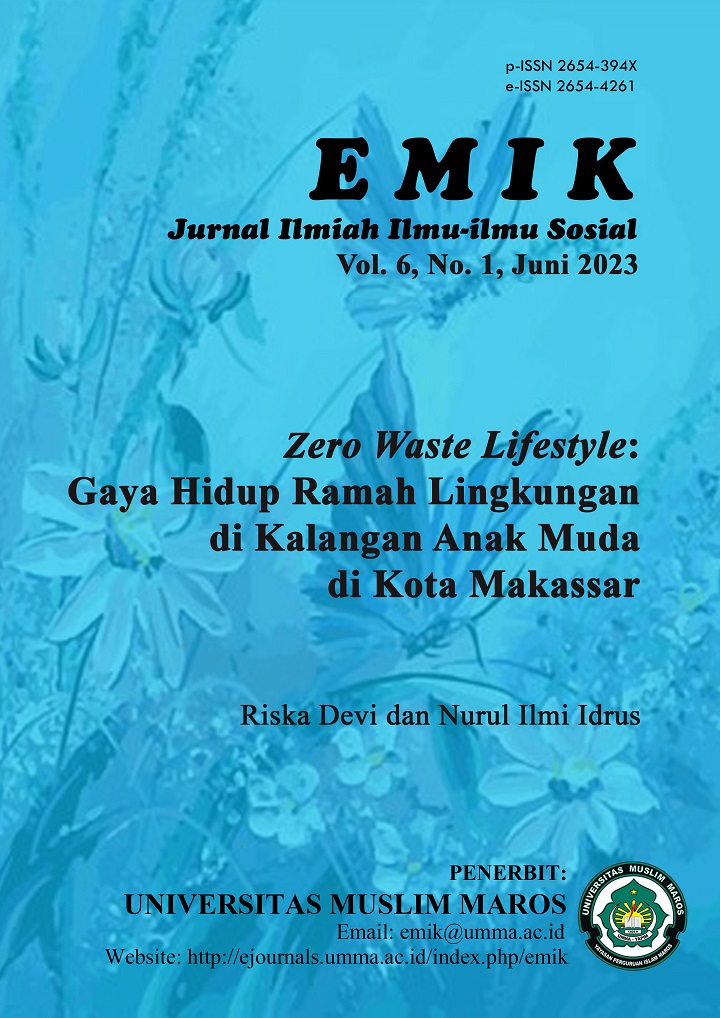Zero Waste Lifestyle: Gaya Hidup Ramah Lingkungan di Kalangan Anak Muda di Kota Makassar
DOI:
https://doi.org/10.46918/emik.v6i1.1667Keywords:
Environment, waste, lifestyle, zero waste, youth, awarenessAbstract
Increased waste production has an impact on environmental problems. This has attracted social attention these days, through preventive efforts to reduce the amount of waste. One of the efforts in dealing with such a problem is by applying a zero waste lifestyle. While the existing literatures paid more attention to provide an understanding of the importance of protecting the environment and how to deal with it, this article discusses environmentally friendly lifestyle among youth.
This qualitative research was conducted in the city of Makassar, South Sulawesi, between August and December 2022. There are ten informants involved in this study who have practiced zero waste lifestyle. They vary according to sex (eight women and two men), age (between 22 and 33 years), and status (three college students, two freelancers, a government employee, a bulk store employee, a public organizing staff of WALHI South Sulawesi, a content writer, and anentrepreneur. This study combined in-depth interview and observation as data our collection methods.
The study shows that a zero waste lifestyle is present as a one of the efforts to the environmental problem today, aimed to minimize waste production. There are several reasons why some applies a zero waste lifestyle, namely: knowledge, environmental awareness, and thrifting. The practice of applying zero waste lifestyle is based on the 6R’s of theenvironmental sustainability concept which include rethink, refuse, reduce, reuse, rot, and recycle. But, it is not easy to practice a zero waste lifestyle, there are some obstacles faced by those who practice this kind of lifestyle. These obstacles are unsupportive environment and the assumption that a zero waste lifestyle is complicated and is an expensive way of life. Despite the fact that practicing zero waste lifestyle is not an easy and requires one’s strong commitment to apply, but when this become habit, it may have a considerable impact on oneself and others when everyone thinks the same way.
References
Dalvin, A. 2021. Konstruksi Sosial Zero Waste: Studi Kasus Pada Masyarakat Kelurahan Ballaparang Kecamatan Rappocini di Kota Makassar. Skripsi, Fakultas Ilmu Sosial dan Ilmu Politik, Universitas Hasanuddin, Makassar.
Disdukcapil. 2023. Berapa Jumlah Penduduk Bumi Saat Ini? Simak Kata Dukcapil. https://disdukcapil.palangkaraya.go.id/berapa-jumlah-penduduk-bumi-saat-ini-simak-kata-dukcapil/, diakses tanggal 11 Mei 2023.
Farouqi, M. I. 2022. Penerapan Gaya Hidup Zero Waste Sebagai Upaya Menyelamatkan Lingkungan. https://dampaksosial.id/insight/penerapan-gaya-hidup-zero-waste-sebagai-upaya-menyelamatkan-lingkungan/, diakses tanggal 28 November 2022.
Fatih, M. A. 2022. 7 Unsur Kebudayaan dan Contohnya – Materi Sosiologi Kelas 11, https://www.zenius.net/blog-unsur-kebudayaan-dan-contohnya, diakses tanggal 28 November 2022.
Hamidah, L. 2018. Teknologi Pengolahan Sampah Skala Besar: Ecobrick, Minyak Pirolisis, Batako dan Paving Block, dan Campuran Aspal. Temanggung: Desa Pustaka Indonesia.
Handayana, I. G. N. Y.; Angraini, L. M.; Sudiarta, I. W.; Qomariyah, N.; dan Alaa, S. 2019. “Gerakan Zero Waste Sebagai Pendidikan Lingkungan Bersih”, Jurnal Warta Desa, 1(3):279-288, https://www.jwd.unram.ac.id/index.php/jwd/article/download/70/47/244, diakses tanggal 5 Maret 2021.
Hikmah, S. N. 2020. Minimalisme Studi Kasus 3 Perempuan Karier Bergaya Hidup Minimalis di Kota Makassar. Skripsi, Fakultas Ilmu Sosial dan Ilmu Politik, Universitas Hasanuddin, Makassar.
Imron, M. 2019. What is Zero Waste?. https://zerowaste.id/zero-waste-lifestyle/what-is-zero-waste-anyway/, diakses tanggal 7 Maret 2021.
Imron, M.; Budiyanti, F.; Amalia, F.; Laraswati, T.; Virgiani, C.; Gitashania, N.; Hidayah, Y.; dan Farrasati, N. K. 2021. Zero Waste Starter Handbook. Bali: Zero Waste Indonesia.
Komari, A. S.; Abdulhak, I.; dan Heryanto, N. 2013. “Sikap Ibu Rumah Tangga Terhadap Program Zero Waste lifestyle di Kelurahan Sukaluyu Kota Bandung: Studi Desriptif terhadap Anggota Yayasan Pengembangan Biosains dan Bioteknologi Bandung Dilihat Berdasarkan Status Sosial Ekonomi Berbeda”, Jurnal Pendidikan Luar Sekolah, 9(2):1-9, https://ejournal.upi.edu/index.php/pls/article/view/5417, diakses tanggal 26 September 2022.
Kurniawati, R. 2020. “Sosialisasi NTB Zero Waste Melalui Literasi Digital”, Jupiter, 17(1):46-60, https://journal.unhas.ac.id/index.php/jupiter/article/view/11313, diakses tanggal 5 April 2021.
Munsir, I. 2022. TPA Antang Makassar Melebihi Kapasitas, Sampah Menggunung 50 Mater. https://www.detik.com/sulsel/berita/d-6000340/tpa-antang-makassar-melebihi-kapasitas-sampah-menggunung-50-meter/amp, diakses tanggal 12 Mei 2023.
Nizar, M.; Munir, E.; Munawar, E.; dan Irvan, I. 2017. “Manajemen Pengelolaan Sampah Kota Berdasarkan Konsep Zero Waste: Studi Literatur”, Jurnal Serambi Engineering, 1(2):93-102, https://ojs.serambimekkah.ac.id/jse/article/view/500/458, diakses tanggal 7 Maret 2021.
Nurjanna, A. dan Ali, M. 2021. Persebaran Air Lindi TPA Benowo Terhadap Kualitas Air Tambak, https://download.garuda.kemendikbud.go.id/article.php?article=240114&val=22924&tittle=PERSEBARAN%20AIR%20LINDI%20TPA%20%BENOWO%20TERHADAP%20KUALITAS%20AIR%20TAMBAK, diakses tanggal 21 Mei 2023.
Octoria, D. 2022. 5 Manfaat Decluttering, Bukan Sekadar Bersih-bersih. https://www.idntimes.com/life/diy/amp/delweys-octoria/manfaat-decluttering-c1c2, diakses tanggal 10 Desember 2022.
Pradita, N. F. 2021. Anak Muda dan Zero Waste; Dari Perubahan Gaya Hidup Hingga Kebijakan. https://aliansizerowaste.id/2020/09/11/anak-muda-dan-zero-waste-dari-perubahan-gaya-hidup-hingga-kebijakan/, diakses tanggal 10 Oktober 2022.
Prasetyo, K. dan Hariyanto. 2018. Pendidikan Lingkungan Hidup Indonesia Dasar Pedagogi dan Metodologi. Bandung: PT. Remaja Rosdakarya.
Puger, I. G. N. 2018. “Sampah Organik, Kompos, Pemanasan Global, dan Penanaman Aglaonema di Pekarangan”, Agro Bali: Agricultural Journal, 1(2):127-136, https://ejournal.unipas.ac.id/index.php/Agro/article/download/402/327, diakses tanggal 6 Mei 2023.
Putri, A. M. H. 2023. Salip China, Jumlah Penduduk India Kini Terbanyak di Dunia. https://www.cnbcindonesia.com/research/20230208112247-128-412053/salip-china-jumlah-penduduk-india-kini-terbanyak-di-dunia, diakses tanggal 5 Mei 2023.
Resti. 2022. Mengenal Zero Waste, Gaya Hidup Bebas Sampah Peduli Lingkungan. https://www.dailysia.com/mengenal-zero-waste-gaya-hidup-bebas-sampah-peduli-lingkungan/, diakses tanggal 28 November 2022.
Ridwan, M.; Hidayanti, S.; dan Nilfatri. 2021. “Studi Analisis Tentang Kepadatan Penduduk Sebagai Sumber Kerusakan Lingkungan Hidup”, Jurnal Indra Tech, 2(1):25-36, https://ojs.stmikindragiri.ac.id/index.php/jit/article/download/43/27, diakses tanggal 5 Mei 2023.
Rizaty, M. A. 2023. Indonesia Ikut Sumbang Sampah Plastik Laut Terbesar di Dunia. https://dataindonesia.id/ragam/detail/indonesia-ikut-sumbang-sampah-plastik-laut-terbesar-di-dunia, diakses tanggal 5 Mei 2023.
Rohman, Fathnur. 2022. Recycle Adalah Upaya Daur Ulang, Kenali Konsep dan Contohnya. https://katadata.co.id/amp/intan/berita/61dfbab884bf9/recycle-adalah-upaya-daur-ulang-kenali-konsep-dan-contohnya, diakses tanggal 6 Mei 2023.
Saputro, D. F. H. dan Hernawati, R. I. 2020. “Sosialisasi Zero Waste Lifestyle di Lingkungan Fakultas Ekonomi dan Bisnis Universitas Dian Nuswantoro”, Abdimasku, 3(3):165-172, https://doi.org/10.33633/ja.v3i3.100, diakses tanggal 26 September 2022.
Sasetyaningtyas, D. 2020. Sustaination: Zero Waste Bukan Hanya tentang Mengganti Sedotan Plastik. Solo: Metagraf.










9.png)















